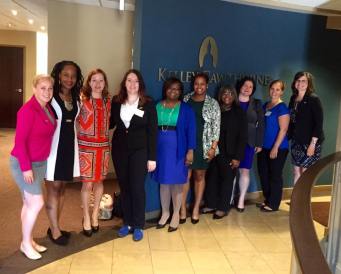This follow-on piece to the workshops and blogs in which I have previously used the concept of “Queering the Value Equation” (see here and here) was originally intended to be a chapter in the book I am currently working on. The working title for the book changed, and with the change in perspective (funny how that is, one loves changes in perspective), this chapter now really didn’t fit in the book any longer, so here it is, for you, my dear readers. And let it be a slight apology that life events have not made the late winter / early spring conducive to writing, and so this blog has not been updated very often.

Much like workplaces that include women actually become better workplaces and better performing organizations, can inclusion make feminism better for everybody involved? Source: Fotolia
I have recently given a couple of iterations of a presentation I decided to call Queering the Value Equation. I introduced this idea of a queered value equation in the context of ending discrimination in the workplace against LGBT people, but truly, it applies very well to a conversation about girls and women. In its simplest form, in the business world*, a value equation is a very simple decision making tool. Value is defined as the ratio of what you get, to what you give — high value is getting much and giving little, and low value is getting little and giving much.

My fundamental “unqueered” value equation argument was that, when companies thought about LGBT inclusion, they understood the benefit to them poorly, and they exaggerated if not fabricated the cost. As a result, they approached inclusion from the perception that it offered very poor value, and even if they were not conscious of it, this caused them to drag along, struggle, and as advocates of inclusion (since they advocated for it, even though they perceived its value to be poor), placed them in a defensive, ineffective posture.
That queered value equation, in the context of the LGBT community, looks a little like this:

In essence, the only reason that (straight) people were advocating for LGBT inclusion in the workplace was because it made them feel good about themselves, or even more particularly, better about than others. That’s fine and good, but it’s a weak business motivation. They perceived, and very clearly the depiction above is meant to make fun of this, some fairly absurd costs associated with inclusion, most of which circle from wanting to include LGBT people without actually understanding us or appreciating the way we think or act. You could see how this applies to women. Indeed, when women were not in many kinds of American workplaces**, and we began the process of changing this, this value equation seemed much the same. Of course water cooler conversations became awkward — many of them were about objectifying women, and it is certainly more awkward (although this seems to stop no one) to objectify us when we are standing right there. There were increased costs — many offices didn’t even have a women’s room, and certainly, those bins for tampons cost, well, a prohibitive amount. And the fun in work was, sometimes, rooted in the idea of the workplace as a man cave, to which a man went to avoid his wife***, and this would certainly be shattered as well.
A concept, dear readers, I wish to consider, is that this problem occurs not only when patriarchy, men, society, consider women, but it exists inside feminism, too. It is at the root of, say, exclusionary movements inside feminism. There is a perception that the “cost,” for instance, of accepting me as a co-advocate, because I am trans, is too high — you know, my “male privilege” and “male energy” polluting the environment like I’m leaching bisphenol A into the water, etc.**** — and the value, is too low, if even existent. Or there is some strange idea that if feminists were to include sex workers in their ranks, we would somehow have to move our meetings to strip clubs, or, I don’t know what. There is a perception that, if we talk about economic marginalization, “we” distract ourselves from “real” women’s issues. And certainly, there is a perception that we want more “women like us” to be part of the sisterhood, and if we don’t have anything in common with other feminists, we think it should be no fun at all.
In my LGBT inclusion work, I argue that the antidote to this is to — substantially — revise the value equation. I argue that, in fact, there are a host of benefits and hardly any costs to LGBT inclusion in the workforce. And, importantly, I argue that one should do it because it delivers benefits, not because it is the “right” thing to do. This is actually really critical. Oh, I like it when people feel good about themselves because they help me. But I also believe that charity as a model is ephemeral and unsustainable. It lasts through the feast and not the famine. And I really do believe that inclusion is something that works. In this same way, we need an inclusive value equation for feminism.
My queered value equation may actually serves as a good starting point.
With respect to ending sexism, although I focus on girls and women, I do talk about men, too, like my blog, “Sexism is Bad for Men, Too” from 2015. But consider some concrete examples. Quantopian did a study of Fortune 1000 companies between 2002 and 2014. The study, summarized by Forbes Magazine, found that women CEOs outperformed the S&P 500 benchmark by a staggering 226% over eight years. Lest you think we just do well in the “big box” (where I, myself play) Forbes also reported results from a Centre for Entrepreneurs study in 2015. The Centre found that women make better entrepreneurs, too, because they are better at managed risk and self-monitoring. Outside of business, a 2015 Washington Post piece summarizes decades of research that shows that putting more women on the police force reduces police brutality. These, and many others, are “mainstream” benefits — not some medal given out by us as feminists.
And like my queered value equation, if the “I” in the equation is men*****, the result actually improves men. I’m not saying that women are just intrinsically better CEOs, for instance. Rather, the systematic differences in performance in this role that are seen when women hold it are relatively underrepresented, because there are few female CEOs, and men do not particularly have to worry that, say, their board will read the results of these studies and fire them in favor of a woman who will outperform them. Because of this, men are incentivized to act “like men” in this role, as well. Imagine, for instance, a situation in which 50% of Fortune 1000 CEOs were women, instead of the <10% in the article. In that situation, while it is still probably unlikely a man would explicitly be fired because replacing him with a woman would improve company performance******, men would be frequently compared to women, his processes to her processes, and his outcomes to her outcomes, and men would likely be strongly motivated to emulate the winning strategies of women (which are probably not, at least not entirely, immutable characteristics of something like our different cognitive architecture or our hormonal milieu).
Inside feminism, similarly, we need to think about these challenges I’ve been highlighting as signs of inborn error in our value equation. The value equation is not an attempt to commercialize feminism. This is, itself, an important discussion. The authors of the #FemFuture report and others have coined the Non-Profit Industrial Complex (a term that seems to go at least as far back as Ruth Gilmore, Dylan Rodriguez, and others at the initial The Revolution Will Not Be Funded: Beyond the Non-Profit Industrial Complex, on my birthday in 2004, more than ten years ago, and before that, goes to a much longer discussion of shadow states and shadow governments. There are important consequences of deferring important, mission critical (if one’s mission is sustainable, ethical society) work to a diffuse network of non-profit organizations relying on donor funding, and, when the state feels like it, grants, much as there are serious consequences for privatizing things like the military, police force, or prison system (not that we’d do that). On the other end, Dan Pelotta, in his 2013 TED Talk, “The way we think about charity is dead wrong,” argues that nonprofits are hampered from efficacy in many situations because they play by a different set of rules than for-profit entities, limiting their access to capital (from a capitalistic / entrepreneurial standpoint, access to capital is the lifeblood of innovation) and limiting their access to great talent or world-class solutions. Both of these arguments are important arguments*******.
However, economics does not just apply to money. Economics is much more broadly an analysis of the way things work (and the ways they don’t work). The value equation isn’t about money, although that is the way it is usually considered. It’s about decisions you make about whatever you value. A slice of your time. Your energy. Your thoughts. Your voice. Your heart or passion. Rather than making a capitalistic argument, I hope, like me, you value at least some of those other things way more than your money. And the value equation is about decisions you make about whatever demands whatever you value — causes, movements, issues, not just how you spend your cash or where you swipe your credit card or tap to pay.
In this light, the value equation is just an attempt to uncover a process that is already happening, of which we are unaware, but, like gravity (or sexism) affects us anyways********. This makes it much like classic feminist analysis tools, such as inverting a gendered statement about the world and examining our reaction to the statement when applied to men in the way it is to women, and to women in the way it is to men. The more we recognize about our current value equation around inclusive, proud feminism, the more we can understand why we are not achieving it, and what we haven’t been ready to admit we believe. The more we create an inclusive value equation for future feminism, the more we can center ourselves on the benefits feminist movement derives from inclusion, which give us robust, sustainable reasons to improve feminism. And like the effects of ending sexism, itself, on men, I believe and intend to demonstrate that an inclusive feminism actually has more, and not less, to offer all girls and women, including the “bluebloods” among our sisterhood (of whom I may be sometimes a one*********) who are frequently most resistant to inclusion and who (when they are motivated to include) do it from a sense of noblesse oblige and not from a perception that it will make feminism better.
* There are numerous jokes to be made at this point about men liking to measure things, etc.
** Certainly, we have always worked, and much more often perhaps still than men, have essentially no vacation, ever. For instance (and I love my Teri very much), where we go on vacation, it’s incumbent on me to… make hotel reservations, pull up directions, find lists of sights to see and present them to Teri, go back and find alternate sights to see because I haven’t found what Teri wants, find restaurants Teri will like, and even in our case, do most of the driving. So, I quip, evenwhen we are on vacation I am working. As I take the week off, at the moment, for writing time for this book, I am still responsible for making the meals, grocery shopping, getting issues with the house addressed, cleaning, and so on and so forth.
*** There is an engineering joke in bad taste, although it really is more making fun of engineers than misogynistic, that goes like this: Why should an engineer always have a mistress? Because his wife will think he’s with his mistress, and his mistress will think he’s with his wife, and he can go in the lab and get some work done.
**** Something you should know about me being trans is that I made the least convincing pretend man, ever, and this I think contributed to why no one was particularly surprised when I came out. Teri and I have a game — I tell him, “I could totally be a guy,” and he laughs in my face.
***** Which, one quips, it is — that’s kind of the whole thing about patriarchy.
****** One does feel the need to point out that, just weeks before I wrote this, Ellen Pao was forced from her role as CEO for an internet darling, Reddit. In her time there, she was well known both for changing company policy in innovative ways that improve diversity, such as eliminating salary negotiation, as well as for reforming Reddit as a service, by eliminating areas, or subreddits, that were perennially used for sexual harrassment. She stepped down after an epic wave of misogynistic trolling against her. Ironically, after a random feminist post, I did some reading through “The Red Pill” on Reddit… and, well, I’m not going to link it. It’s easy to find. Be forewarned.
******* By way of disclosure, my employment was in the non-profit sector when I wrote this, although I currently own and operate a small, for-profit consulting firm. The NPO world was new to me — as an engineer, I worked in large for-profit companies, mostly publicly traded — Ford, Visteon, Textron. I’ve spent a significant portion of my adult life at universities, too, though, mostly public (the Universities of Michigan and Florida), but also private (the University of Chicago), which operate according to their own philosophy that is not exactly like cause-based non-profit work nor like for-profit enterprise.
******** And feminism is dedicated to the radical notion that sexism is way more endable and way less a basic reality of the universe, than gravity is.
********* I said sometimes, when I wrote this last Fall. Now I hasten to admit, quite often.
















I had the opportunity last week to speak briefly, on television, about inclusion of LGBTQ students, particularly focusing on transgender students. This comes in the context of a draft guidance from our state Board of Education, and I want to share more detailed thoughts on that topic.
Thank you so much to WOOD TV 8 for having me out to discuss the need for schools that are safe and empowering for all Michigan kids
Below is the text of my public comment on the Michigan Board of Education’s Draft Statement and Guidance on Safe and Supportive Learning Environments for Lesbian, Gay, Bisexual, Transgender, and Questioning (LGBTQ) Students (you can read the guidance here). Public comments are being accepted through May 11, 2016, and if you have something to say, I strongly encourage you to speak. You can make your comment and read comments here.